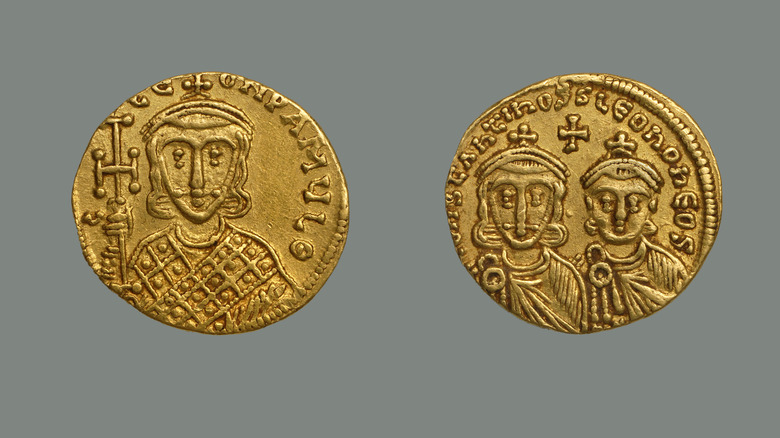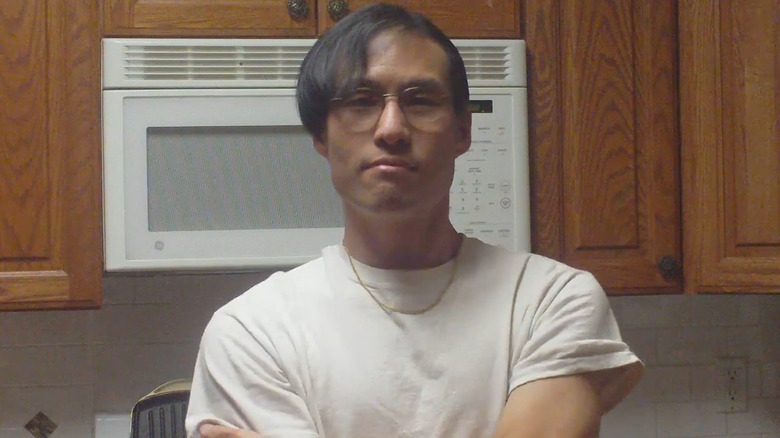Mankind's Attempts To Achieve Immortality Are Downright Wild
We may receive a commission on purchases made from links.
Since the dawn of time, mankind has searched for the impossible: biological immortality. Humans have ventured to the ends of the Earth, looking for mythical legends — such as elixirs of life or the Fountain of Youth — in hope that they will be able to outrun the grim reaper's ticking clock and defy the natural order. From the belief that gold or mercury holds the power to stop the process of aging to bathing in the blood of the young and immortality rings, these theories have left many of us shocked by the lengths that some people will go to fulfill their desire for eternal life. Having said that, many snake oil salesmen have popped out of the woodwork, too, capitalizing on obsession and selling false dreams to the gullible. It's a slippery slope between fact and fiction when it comes to this topic, that's for sure.
Ironically, the quest for immortality continues, as futurists believe the solution lies in how humans and machines will become one. Does this mean that eternal life is closer than ever and an inevitability rather than a possibility at this point? Stay tuned. In the meantime, check out mankind's most bizarre attempts at immortality throughout history that continue to be spoken about to this day.
Gilgamesh couldn't stay awake for six days
In terms of ancient Mesopotamia, the king of Uruk, Gilgamesh, remains a widely discussed and debated figure in literature. His story was captured in the "Epic of Gilgamesh," which was discovered by archeologist Sir Austen Henry Layard in 1849. Indeed,the myth of Gilgamesh turned him into a legend. In the epic, Gilgamesh wants to avoid death, so he seeks out the wisdom of the fabled former king Utnapishtim, an ancient man who built a boat and survived the flood of all floods. Utnapishtim explains how he heeded the instructions of the god Ea and saved both himself, his family, and various animals. Afterward, he was granted eternal life.
Utnapishtim reveals to Gilgamesh that he, too, will be granted immortality if he proves himself to the gods by staying awake for six days. Unfortunately, Gilgamesh turns out to be too similar to the rest of us who fall asleep as soon as a new episode of a Netflix series starts, and he fails almost immediately here. Utnapishtim gives him another chance, though, informing him of a plant at the bottom of the ocean that holds the secret to immortal life. Gilgamesh finds it, but a snake snatches it from him. In the end, Gilgamesh receives a sobering lesson: "Life, which you look for, you will never find. For when the gods created man, they let death be his share, and life withheld in their own hands."
Qin Shi Huang searched for the elixir of life
Among different cultures and across several centuries, humans have searched for the elixir of life. The common belief is that it's a potion or liquid one drinks that grants them the gift of immortality. Yeah, it does sound like something that the druid Getafix cooks up in a cauldron in an "Asterix & Obelix" story, but we digress. One of the people who dedicated their life to searching for this elixir was Qin Shi Huang, who was born Ying Zheng and became China's first emperor.
He was reportedly obsessed with immortality. It was to the point that the emperor set up expeditions and sought out the help of magicians to discover the mysterious substance that he believed could achieve it. Even after his death, the mission continued under different leaders who also searched high and low to find out if this medicine or mythical concoction actually existed somewhere, anywhere, in the world.
As per David Curtis Wright's "The History of China," Qin Shi Huang wanted to stop his own aging or find something to reverse the process. The emperor developed a fascination with mercury, assuming that it could hold the answer to eternal life. Why mercury? When people die from mercury poisoning, their bodies often decay slower than usual, which might have driven the belief that it's tied to immortality. In the end, it's believed that Qin Shi Huang likely died from consuming too much mercury.
Elizabeth Báthory bathed in the blood of the young
The legend of Elizabeth Báthory, also known as the Blood Countess, could have been pulled straight out of a horror story. The Hungarian noblewoman turned herself into one of history's most notorious serial killers after rumors spread about the nature and reason of her heinous crimes. The story continues to be passed down among generations, though there are now doubts about the validity of the claims. Particularly, some wonder if Báthory was really the bloodthirsty monster many said she was or a victim of a wider conspiracy. Locals continue to tell the myth of the Blood Countess, who took somewhere between 100 and 650 lives with the aid of her three servants, though the number of victims that Elizabeth Báthory claimed is still disputed.
According to legend, Báthory believed the blood of virgins would help her maintain her youth and stop the signs of aging. So, she would find peasant girls, torture them in cruel ways that can't even be printed here, then bathe in their blood. After she started to run out of victims in town, Báthory turned her attention toward the young daughters of nobility, murdering them too. Questions started to be asked while whispers spread of Báthory's actions. This culminated in the Hungarian king ordering an investigation. Ultimately, Báthory and her three servants were found guilty. Their punishment? They were tortured and burnt to death for their crimes.
Many people believed that gold held the key to immortality
One of the elements closely associated with the quest for immortality is gold. The interest in gold as an elixir of life spans all the way back to the 25th century B.C. Since the chemical doesn't corrode, the belief was that it must contain some everlasting quality that can do the same for the human body. People started to eat it under the impression it would add years to their life.
A significant development occurred when noted alchemist and chemist Abu Musa Jabir Ibn Hayyan Al-Azdi discovered a way to dissolve gold and turn it into a gold chloride that was drinkable. Many heralded it as the elixir that everyone had been searching for. Despite others building upon Al-Azdi's formula and proclaiming gold's powerful potential to treat illnesses and prolong life, the only thing that liquid gold succeeded in doing was giving everyone kidney damage.
Gold continues to be explored and used for the treatment of forms of arthritis. Its antioxidant qualities have also made it popular among anti-aging skincare treatments. These skincare routines are topical, though, and don't involve ingesting the chemical. That being said, edible gold has become part and parcel of culinary experiences, especially as a garnish.
The Royal Fraternity of Master Metaphysicians' strange attempt at immortality with a baby
There are still many questions about the Royal Fraternity of Master Metaphysicians. Was it a cult? Was it a faith-based group? Was it something else? Founder James B. Schafer didn't want to define it. The group found itself in the headlines in November 1939 when it announced plans to adopt a baby and prove that immortality was indeed possible under the right circumstances.
As reported by the Daily Mail, the Metaphysicians had adopted five-month-old Jean Ganutt from her parents, who had encountered financial difficulties. The plan was to raise the child at their headquarters, the Idle Hour mansion, which had been renamed Peace Haven. She would eat a vegetable diet, and nobody would be allowed to mention death or disease around her. The Metaphysicians believed that "illness and death result from destructive thinking."
The experiment didn't last too long — 15 months to be exact — as Ganutt's mother wanted her child back home, and the Metaphysicians returned her. In the years thereafter, Schafer was accused of scamming his followers out of money, went to prison, and died by suicide. In terms of Ganutt, the last known update about her came courtesy of Fechter in October 2002, saying that she was alive but didn't want to discuss her past.
A Russian professor and his friend believed radioactive material held the secret to eternal life
Friends help each other wherever possible. In fact, some people don't even ask what the request is before saying yes. In 2013, a 35-year-old Russian college professor proved that he's either the greatest friend in the world, or the most gullible.
According to Ria Novosti, Russian police brought in the college professor for questioning after the authorities discovered around 30 pounds of radioactive material split between his apartment and garage. As per the professor's explanation, his friend believed he could become immortal if he exposed himself to radiation. They had acquired this material from "special places and burial sites," and the friend had allegedly gone to the Chernobyl disaster site to expose himself "to expose himself to radiation and become immortal."
A criminal case was opened against the professor for the storing of the radioactive material in his home, with a potential prison sentence of seven years. As of this writing, there don't appear to be any updates on the case in any media reports. Look, either these men believed their plan to be entirely plausible, or they read too much of "The Incredible Hulk" comic books, thinking that exposure to gamma radiation could also turn one of them into an unstoppable angry green giant.
A scientist injected himself with 3.5-million-year-old bacteria
Science requires a hypothesis, experimentation, and results to prove something to be true. In the case of Russian scientist Anatoli Brouchkov, he decided to follow this three-step process on himself — an ethical dilemma, yes. In 2009, researchers made a major discovery at a Siberian permafrost site in the Sakha Republic — they found a 3.5-million-year-old bacteria known as Bacillus F. What's fascinating about this is how the bacteria managed to survive in the harshest conditions for so long.
Naturally, scientists grew interested in the possibilities of this bacteria and conducted experiments on other animals and human cells to see what the effects would be. Brouchkov took it one step further, though: He injected himself with Bacillus F. Speaking to RT (via Vice), he proclaimed that he's noticed a positive effect on his life since the bacteria entered his body. "I started to work longer," Brouchkov said. "I've never had a flu for the last two years. But it still needs experiments. We have to work out how this bacteria prevents aging."
Brouchkov added how he believes there to be "immortal bacteria," which essentially protects cells from any possible damage. Humans don't have this with our own cells, but Brouchkov thinks the answer to eternal life could lie in Bacillus F. As of now, studies examining the effects of Bacillus F on animals, insects, and crops have been promising. For example, crops exposed to the bacteria experienced faster growth and increased frost resistance. No word yet on whether it's the key to immortality.
People believe there might be more to the plot from Demolition Man
"Demolition Man" delivers a sci-fi-tinged spectacle where Sylvester Stallone's John Spartan is cryogenically frozen along with Wesley Snipes' Simon Phoenix, then awakened decades later as the two enemies continue their fight. It's a film that asks the billion-dollar question: Can cryogenically frozen humans be revived? While this might seem like a ridiculous what-if scenario envisioned by a Hollywood screenwriter looking to create the next big summer blockbuster, cryonics isn't exactly something new.
Founded in 1972, the Alcor Life Extension Foundation is one of the organizations leading the charge in cryonics. By the foundation's own definition, "Cryonics is the practice of preserving life by pausing the dying process using subfreezing temperatures with the intent of restoring good health with medical technology in the future." Over the decades, hundreds of bodies have been stored in these states as scientists work on ways to revive them.
While no human being has been successfully reanimated to date, the technology continues to evolve and develop at a rapid pace. In 2016, an MIT graduate froze and revived the brain of a white rabbit, giving hope that game-changing advancements may not be too far off. But even if cryonics succeeds in reviving a human in the future, there are ethical questions to consider. Imagine waking up in the future, decades removed from your own era, with no family and friends, and trying to navigate a world you know nothing about. Scary.
Heinrich Himmler searched for the Holy Grail and Thor's hammer
Heinrich Himmler's name remains notorious in history due to his role in the Nazi Party as a key perpetrator of the Holocaust. In his sinister quest to create and secure the future of the Aryan race, he developed an obsession with replacing Christianity with his own supremacist philosophies and occult ideologies. Himmler even viewed the SS as similar in impact to the Teutonic Knights, planning to turn the Wewelsburg Castle into his own twisted Camelot.
Despite not being a follower of traditional Christianity, Himmler and Adolf Hitler started a bizarre hunt for the Holy Grail, an artifact often associated with healing powers or eternal life. Himmler believed the Grail to be a great source of power, heading off on a mission to find and claim it as a symbol for the Aryan faith in 1940. The crusade failed.
That wasn't Himmler's only obsession — he also believed that Thor's hammer actually existed and needed to be secured. The military leader thought the hammer was a weapon designed by his forefathers and wanted to use it in the Third Reich. According to Sky History, he instructed the Ahnenerbe to "find all places in the northern Germanic Aryan cultural world where an understanding of the lightning bolt, the thunderbolt, Thor's hammer, or the flying or thrown hammer exists." The hammer is considered a weapon of the gods, so it's probable that Himmler viewed anyone who wielded it as a deity, powerful beyond measure.
Alex Chiu claimed he made immortality rings
While mankind searched for elixirs of life and the Fountain of Youth, Alex Chiu invented what he purports to be immortality devices. Patented in 1998, Chiu claims that his Eternal Life Rings and Eternal Life Foot Braces heal the body at a faster pace than you age, effectively keeping you younger. How does it work? According to Chiu's website: "When placing the magnetic devices, the magnetic pole on the right side of the human body is opposite to the left side. With [an] opposite pole on each side of the human body, blood circulation and electric current of the body are enhanced. The enhanced blood circulation and electric current increase metabolism in order to fight the aging process."
While Chiu says that the testimonials and reviews from happy customers over the decades demonstrate that his inventions work as advertised, there's still a lot of debate about the validity of his claims. The immortality rings have become something of a meme online, with one Amazon customer writing a one-star review that they recently died, proving that the immortality wasn't delivered as promised. Even Wired once referred to Chiu's immortality rings as a "medical scam."
Want to read more about the topic of eternal life? Check out how one jellyfish is capable of near-immortality.
If you or someone you know is struggling or in crisis, help is available. Call or text 988 or chat 988lifeline.org.










